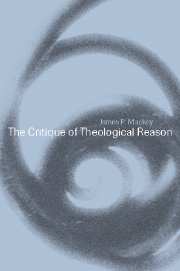Prologue
Published online by Cambridge University Press: 22 September 2009
Summary
This essay on the nature, function and truth value of theology, and on the very prospects for theology in this very self-confidently proclaimed postmodernist era, is based upon two assumptions, and it makes use of a particular investigative hypothesis; and each of these had better be declared openly at the outset.
The first assumption concerns an intrinsic and essential link that binds theology to philosophy. This link can be explained and expressed from a variety of perspectives. From the perspective of the genesis of Western philosophy, explained as a move from mythos to logos, where logos named the rational investigation of the physis ton onton (the nature or dynamic centre of the things that are), theology was simply the name for that same rational investigation of all reality, at the point where it managed to meet the deepest entity that seemed to be the central source of all the moving universe. At that point, whenever and however it was thought to be reached, philosophy, without break in its nature or process, became the logos of theos; and by Plato's time had actually been named theology. From the perspective of those Fathers of Western Christian theology who borrowed not merely the method but so much of the content of this earlier Greek theology and put it at the service of the teaching of their own faith, we have this remark of Augustine about the Platonists: ‘change a few words and propositions and they might be Christians’.
- Type
- Chapter
- Information
- The Critique of Theological Reason , pp. 3 - 7Publisher: Cambridge University PressPrint publication year: 2000



